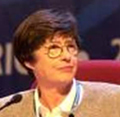2007 Honorees
The theme for National Women’s History Month, March 2007 is Generations of Women Moving History Forward. The 2007 Honorees represent many generations of women who with their amazing intelligence, talent, courage and tenacity testify to the myriad ways that generations of women have moved history forward. The 2007 Honorees for National Women’s History Month are:
Matilda Joslyn Gage (1826—1898)
Women’s Rights Activist, Theorist, and Historian
|
|
Matilda Joslyn Gage was a 19th century suffragist, historian of women, newspaper editor, author and lecturer, woman’s rights activist and theorist, advocate for civil rights, and abolitionist, who served as a top officer in the National Woman Suffrage Association (NWSA) for twenty years. A committed abolitionist who opened her home as a stop on the Underground Railroad, she challenged the laws of her nation, risking arrest and imprisonment by helping fugitive slaves escape to freedom. Gage wrote about the superior position of Haudenosaunee (Iroquois) women and supported treaty rights and Native sovereignty. Influenced by the Haudenosaunee egalitarian culture, she in turn influenced the utopian feminist vision of her son-in-law, L. Frank Baum, in his fourteen Oz books. |
Virginia Foster Durr (1903-1999)
Civil Rights Activist and Author
|
Virginia Foster Durr was born near Birmingham in 1903, her long life bridged the post-Civil War era to the American Civil Rights Movement. The granddaughter of a former slave holder, she became an ostracized anti-racist convert. Her amazing life of determined tenacity testifies to the ability of an individual to be transformed by observation, experience, and basic sense of right and wrong from an unquestioning racist to a courageous activist, organizer, and leader for social justice. |
Martha Wright Griffiths (1912—2003)
Congresswoman Who Successfully Added Sex as a Protected Class in the
1964 Civil Rights Act
|
Martha Wright Griffiths was born on January 29, 1912 in Pierce City, Missouri. As a young woman, she was inspired by the activism and leadership of her paternal grandmother, Jeanette Hinds Wright, a leading advocate for woman suffrage in Pierce City. She was a champion debater in her public high school and continued on the debate team when she went to the University of Missouri. She went to law school at the University of Michigan and graduated in 1940 along with her husband, Hick Griffiths (making them the first married couple to graduate from the law school). |
Constance Baker Motley (1921 -2005)
First African American Woman Appointed to the Federal Judiciary
|
Constance Baker Motley was born on September 14, 1921 in New Haven, Connecticut, the ninth of 12 children born to parents who had emigrated from the island of Nevis in the West Indies. Her pioneering career as a civil rights lawyer, lawmaker and judge spanned six decades and was highlighted by numerous historic achievements, including becoming the first African American woman accepted at Columbia Law School, the first African American woman elected to the New York Senate, the first woman and the first black woman to hold the position of Manhattan Borough President, and the first African American woman appointed to serve as a federal district judge. |
Lupe Anguiano (b. 1929)
Protector of the Earth and Activist for the Poor
|
Defying any single category of cause or action, Lupe Anguiano, an educator, has always worked for the equality of all people. She is a passionate environment volunteer, helping to protect “Mother Earth” from global warming and other destructive environmental hazards. In 1949, she joined Our Lady of Victory Missionary Sisters. As a nun, she worked for fifteen years to improve the social, educational, and economic conditions of poor people throughout the United States. Anguiano was also a United Farm Workers’ Volunteer, working directly under the direction of Cesar Chavez in Delano, California. She led the successfully grape boycott in the entire State of Michigan in 1965. |
Brownie Ledbetter (b. 1932)
Civil Rights Advocate and Activist Working for Equal Opportunity for All People
|
In Brownie Ledbetter’s life, we see a lifetime of dedication to making the world a better place. Her impact on a fair education for all is indelible. In response to the racial crisis in Little Rock, Arkansas in 1957, Brownie worked across racial lines to elect school board members one of the founding members of the Panel of American Women in Arkansas, in 1963. The Panel was composed of women of different ethnic and religious backgrounds, mothers of public school students who spoke to school, church and civic groups about their experiences and their commitment to diversity. In 1981 the Panel of American Women evolved into the Arkansas Public Policy Panel that organized and assisted grassroots groups, eventually founding the Arkansas Citizens Congress and Brownie Ledbetter served as founder and executive director for 20 years. Ledbetter founded the Arkansas Fairness Council, a coalition of education, labor, civil rights and women’s organizations advocating for fair taxes in 1983 and served as president and lobbyist of the Council for 15 years. |
Minnijean Brown Trickey (b.1941)
Civil Rights Activist Who Integrated Central High School in 1957
|
Minnijean Brown Trickey was only sixteen years old when she became involved in one of the most pivotal acts of the American Civil Rights Movement of the 20th century. As one of The Little Rock Nine, she along with eight other Black American teenagers, defied death threats, hostile white demonstrators, and even the Arkansas National Guard, to attend the all-White Little Rock Central High in 1957. Rising above the adversity, she took a courageous step that not only changed her life and education, but the lives and educations of African Americans around the country. |
Barbara Haney Irvine (b.1944)
Founding President, Alice Paul Centennial Foundation, Inc.(now Alice Paul Institute)
|
Barbara Irvine is a national advocate for the recognition and preservation of women’s historic sites. Based on her work to save one woman’s site in New Jersey, Barbara learned that nationwide most historic resources associated with women were generally unrecognized and in jeopardy of being lost forever.She assumed a major role in calling attention to the plight of women’s sites and the interpretation of women’s history at historic sites throughout the United States. |
Mary Ruthsdotter (b. 1944)
Co-Founder of the National Women’s History Project.
|
In 1980, Ruthsdotter co-founded the National Women’s History Project. Along with her co-founders, she developed materials for students, teachers, librarians, parents, workplace organizers, and the media. She produced curriculum units, organizing guides, teacher training sessions, and videos on U.S. women’s history. The thousand of packets of press releases and women’s history information she compiled to promote women’s history were sent to radio, television, magazines, and newspapers throughout the nation. She coordinated the Women’s History Network which linked historians, librarians, performers, and community organizers nationwide. With her efforts, the NWHP became the national clearinghouse for multicultural women’s history resources. She and her husband, Dave, created two award-winning websites. Her amazing work encouraged new generations to discover women’s history and contributed greatly to the knowledge of how women have history forward. |
Rebecca S. Halstead (b.1959)
Commanding General, 3rd Corps Support Command, Wiesbaden, Germany
|
Rebecca Halstead enter the United States Military Academy in 1977. She was one of 104 women to enter in the second class that included women, which was made possible in 1975, when President Gerald Ford signed into legislation the opening for women applicants at all service academies. |
Joanelle Romero (b. 1957)
Launched Red Nation Media Internet and Television Channel
|
Joanelle Romero, humanitarian, filmmaker, actress, recording artist/singer/songwriter, in 2006 launched Red Nation Media Internet and Television Channel with all Native programming. Her accomplishments as a pioneer in film, television, non-profit organizations, educator, philanthropist, producer, director, have established her as one of the most respected and admired public figures today. Born in Albuquerque, New Mexico of Apache/Cheyenne, Jewish and Spanish descent, Romero was raised in Los Angeles on a variety of TV and movie sets, where she learned her craft. (www.RedNation.com). |
Suzanne Lewis (b.1956)
First Woman Superintendent in the History of Yellowstone National Park
|
Suzanne Lewis, becoming the first female Superintendent of Yellowstone National Park on February 10, 2002, testified to a 21st century change in the culture of the National Park Service. There had been a time when women in the National Park Service (NPS) including pioneer rangers, superintendents, and maintenance workers had to fight to win the right to wear the traditional Stetson hat and the gray and green uniform that conferred full authority on their positions in the eyes of the public. Today, the culture of the organization is visibly changed. NPS visitors now hear presentations that incorporate women’s roles in their exhibits and talks. One-third of the fifteen thousand Park Service employees are women and twenty percent of the women represent minorities. Clearly, Lewis is a important representative of a generation of women who are moving history forward. |
Toshi Reagon (b. 1964)
Singer, Songwriter, Blending Every American Style of Music
|
Toshi Reagon was born in Atlanta in 1964 and currently lives in New York City. A musician known for her energetic performances, she has an exemplary gift for writing engaging songs that provoke listeners to think and have fun at the same time. She is an amazing artist who in some ways is a throwback to classic R & B artists, like Stevie Wonder or Prince, or old school rock group like Led Zeppelin. With incredible ease, she can take any style, update it, and make it her own. Despite (or because of) her genre-bending, Reagon fits comfortably on a stage at Carnegie Hall, or in a dirty rock club. http://www.toshireagon.com/ |
Monique Mehta (b. 1973)
Executive Director of the Third Wave Foundation
|
Monique Mehta graduated from Colgate University with a concentration in Sociology and Women’s Studies. Working effectively as a grassroots organizer she helped women and their families deal with compelling problems that included immigrant issues, reproductive health, violence against women, human trafficking, homelessness and organizing low-wage workers. |













